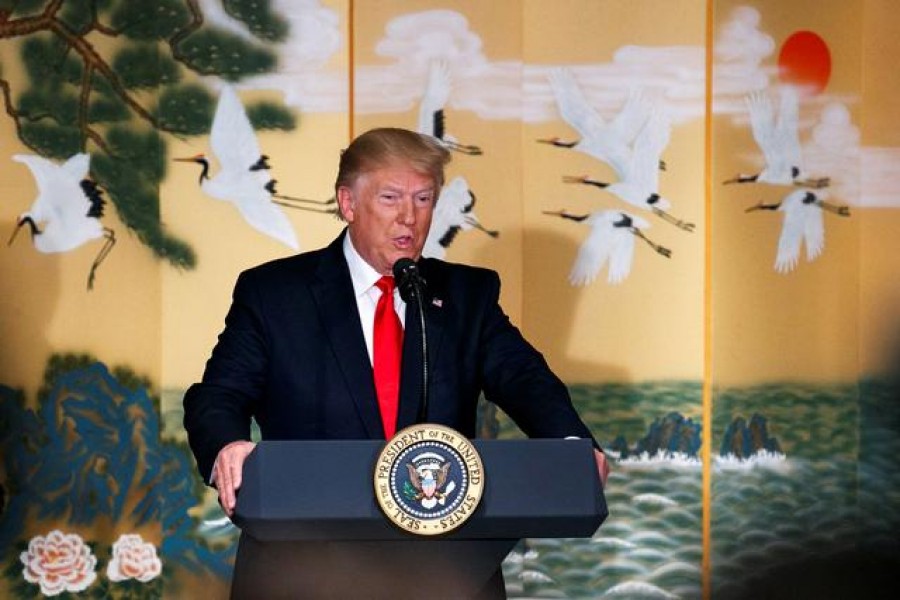US President Donald Trump said on Sunday he and North Korean leader Kim Jong Un both want to meet at the Demilitarised Zone (DMZ) dividing the two Koreas later in the day, raising hopes for an encounter that could jump-start stalled nuclear talks.
Trump arrived in Seoul late on Saturday for talks with South Korean President Moon Jae-in after attending the Group of 20 summit in Osaka, Japan, during which he made a surprise, spur-of-the-moment offer to meet Kim.
If Trump and Kim meet, it would be for the third time in just over a year, and four months since their second summit in Hanoi, Vietnam broke down.
“Well we’ll see. He very much wants to,” Trump said when asked by a reporter whether Kim would meet him at the DMZ later on Sunday when Trump is scheduled to visit the heavily armed border.
“They’re trying to work it out. We both want to do it,” he said after a meeting with South Korean business leaders including the heads of Samsung, Hyundai Motor, Lotte, SK and Poongsan groups.
“It’s going to be very short, virtually a handshake. But that’s OK. A handshake means a lot.”
He said he and Kim had a “good relationship” but there was still a long way to go to reach an agreement that would end the North’s nuclear programme in return for an end to sanctions and permanent peace on the Korean peninsula.
North Korea has pursued nuclear and missile programmes for years in defiance of UN Security Council resolutions, and easing tensions with North Korea is one of the US President’s top foreign policy priorities, says a Reuters report.
Trump made the offer to meet in a message on Twitter about his visit to South Korea.
“While there, if Chairman Kim of North Korea sees this, I would meet him at the Border/DMZ just to shake his hand and say Hello(?)!” Trump wrote.
‘VERY INTERESTING SUGGESTION’
In response, state news agency KCNA quoted a senior North Korean official several hours later saying it was a “very interesting suggestion” and would be a “meaningful occasion,” but that North Korea had not received an official proposal.
Moon told Trump during a dinner on Saturday that such a meeting would be an “historic event.” But even if it did not take place, Moon said, the offer would have a “significant outcome” because Trump showed sincerity to Kim.
Trump wanted to visit the DMZ during a 2017 visit to South Korea, but heavy fog prevented it. Kim and Moon held their historic first summit in the zone last year, which preceded the US-North Korean meeting in Singapore.
Moon has championed efforts to end the hostilities between North Korea and the United States, vowing to play a mediator role in nudging Pyongyang into giving up its nuclear weapons in exchange for sanctions relief and security guarantees.
Moon’s press secretary said late on Saturday that a meeting between Trump and Kim would be a “crucial chance” to reinvigorate the talks. Moon said at his meeting with Trump on Sunday he would go with Trump to the border.
The Joint Security Area, with its cluster of distinctive bright blue buildings, has a checkered history of defections, tension and death. In 1976, axe-wielding North Korean soldiers murdered two American soldiers who were cutting down a poplar tree there to secure a clear view.
Trump, speaking at a news conference in Japan on Saturday, said he would be “very comfortable” stepping across the border into North Korea, as Moon did briefly last year.
Some South Korean analysts said another Trump-Kim encounter would do little to advance progress on denuclearization.
“Trump is trying to get a free hand in controlling peace on the Korean peninsula with his tweets and we can’t let that happen,” said Kim Dong-yup of Kyungnam University’s Institute for Far Eastern Studies in Seoul. “It’s a strategy and technique he adopted to deal with those who are in a weak position in negotiations, and that’s for domestic politics.”


